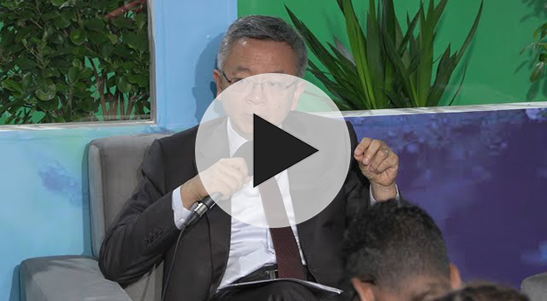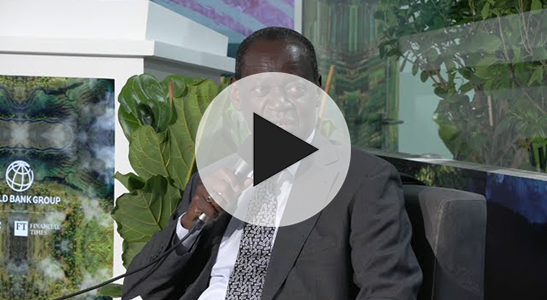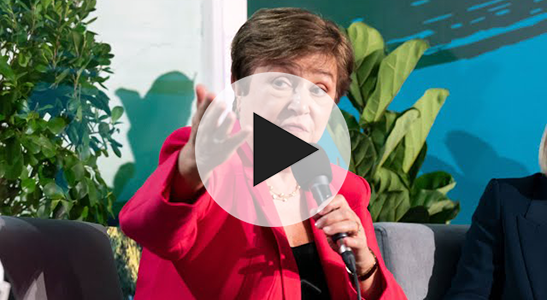Climate Change

The IMF and Climate Change
Climate change presents a major threat to long-term growth and prosperity, and has a direct impact on the economic wellbeing of all countries. The IMF has an important role to play in helping its members institute fiscal and macroeconomic policies to help address these climate-related challenges. We are mainstreaming climate-related risks and opportunities into our macroeconomic and financial policy advice. Climate considerations are now embedded in our bilateral and multilateral surveillance, capacity development, and lending. We also collaborate with other organizations on climate issues.
Through our analytical work we have examined policy issues such as an international carbon price floor, the transition to a green economy, border carbon adjustments, scaling up private climate finance in emerging market and developing economies, strengthening climate information architecture, fiscal policies to support adaptation, and green public investment and public financial management.
Banking on Nonbanks
We study how banking groups adjust corporate credit supply in response to tighter macroprudential policies. Using granular data on syndicated corporate loans, we show that banking groups reallocate lending from bank subsidiaries toward affiliated nonbank financial institutions (NBFIs) following regulatory tightening. Relative to bank subsidiaries within the same group, NBFI subsidiaries expand lending, and their credit supply also increases in absolute terms. We estimate that by ‘banking on’ their nonbanks, banking groups offset, on average, more than half of the contraction in bank lending induced by macroprudential tightening. Our findings highlight an important intra-group reallocation channel through which banking groups can partially offset regulatory constraints and result in greater bank–nonbank interconnectedness.
Distributional Impacts of Inflation Accounting for Behavioral Effects and Real Assets
This paper analyzes the redistributive effects of inflation across 18 European economies from 2021:Q3 to 2022:Q2, using unique micro-datasets for this country sample. We estimate inflation’s impact on household welfare through the consumption basket, income, and wealth channels. Our main contribution is incorporating real assets into the wealth channel and accounting for behavioral responses to inflation in both the income and wealth channels. These factors significantly alter inflation’s distributional effects compared to previous literature. The inflation shock is estimated to have caused an average welfare loss equivalent to 18.5 percent of annual household income across our sample, with households in the poorest income quintiles suffering the largest losses. Cross-country differences also widen when real assets are incorporated, with a few economies even showing welfare gains for some or all quintiles because house prices rose faster than inflation.
Tonga: Technical Assistance Report-Liquidity Management and Forecasting
The IMF conducted a Technical Assistance (TA) mission to assist the National Reserve Bank of Tonga (NRBT) in determining an appropriate policy rate and in implementing an effective liquidity management and forecasting framework. This TA mission serves as a follow-up to previous IMF TA, which provided recommendations to the NRBT for modernizing its monetary policy implementation framework. The mission found that the NRBT has made commendable progress in modernizing its monetary policy implementation framework, including the establishment of an appropriately designed interest rate corridor with standing facilities and open market operations. However, the NRBT’s policy rate of 2 percent lacked analytical justification. In addition, liquidity forecasting was insufficiently robust, limiting effective liquidity management and the potential for interest rate steering. There were also gaps in the institutional arrangements for liquidity management, particularly relating to the lack of systematic daily monitoring of government account flows, which impaired forecast accuracy. To address these deficiencies, the mission recommended creating a dedicated Liquidity Forecasting Unit (LFU) to centralize data collection, forecast daily liquidity, and support policy decisions. The NRBT should utilize advanced statistical techniques provided by the mission to assist with forecasting liquidity and publish the results. In relation to the policy rate, an analytical framework was provided by the mission. A phased approach was also advised for adjusting the policy rate, which entails gradually moving towards an appropriate rate, thereby allowing market adaptation. Implementing these recommendations will enhance monetary policy effectiveness, market development, and safeguard Tonga’s exchange rate peg and financial stability.
Republic of Equatorial Guinea: Third Review under the Staff-Monitored Program-Press Release; and Staff Report
The return to a secular decline in hydrocarbon production after a brief respite during the 2022 energy boom is again straining fiscal and external accounts. Boosting non-hydrocarbon growth is key to delivering a diversified, inclusive and balanced economy. Fund Management approved a 12-month extension of the Staff Monitored Program (SMP) in June 2024 to establish the reform track record required for a potential IMF financing arrangement.
Malta: 2025 Article IV Consultation-Press Release; and Staff Report
Malta's economy has grown rapidly over the past decade, with per capita income nearly doubling since 2013. Growth averaged close to 7 percent annually, led by labor-intensive tourism, online gaming, and professional services, and was supported by inflows of foreign workers. Labor-driven growth supported by immigration, is expected to continue in the medium term but slow in the longer term as Malta, an island economy with the highest population density in the EU, cannot sustain further substantial population and labor force growth through immigration. Without adequate policy and structural reform measures, the inevitable deceleration in labor force growth would weigh on potential output and limit actual growth.
The Bahamas: 2025 Article IV Consultation-Press Release; and Staff Report
The Bahamas has been in the midst of a solid economic recovery, supported by buoyant tourism. This has created space to strengthen public finances, improve the institutional framework for fiscal policymaking, and invest in disaster risk management. Inflation has declined, supported by the peg with the U.S. dollar. An ambitious electricity sector reform is underway but Hurricane Melissa is a vivid reminder that the country remains vulnerable to unpredictable natural disasters.
IMF Executive Board Concludes the 2025 Article IV Consultation, Seventh Review under the Extended Credit Facility Arrangement, and Third Review under the Resilience and Sustainability Facility Arrangement with Cabo Verde
The IMF Executive Board completed the 2025 Article IV consultation, the seventh Extended Credit Facility (ECF) arrangement review, and third Resilience and Sustainability Facility (RSF) arrangement review.
IMF Management Approves the Third Review of the Staff Monitored Program with Equatorial Guinea
Management of the International Monetary Fund (IMF) approved the completion of the Third Review of the non-financing Staff Monitored Program (SMP) with Equatorial Guinea on December 16, 2025
IMF Executive Board Concludes 2025 Article IV Consultation with Malta
Malta’s robust economic performance has continued despite global uncertainties, maintaining growth rates that exceed the EU average, inflation levels near the ECB target, and a sustainable public debt.
Statement by IMF Deputy Managing Director Kenji Okumura at the Conclusion of His Visit to Burkina Faso
Mr. Kenji Okamura, Deputy Managing Director of the International Monetary Fund (IMF), issued the following statement today in Ouagadougou at the end of his visit to Burkina Faso:
IMF Reaches Staff-Level Agreement with Zimbabwe on a New Staff-Monitored Program
The IMF and Zimbabwe have reached a staff-level agreement on economic policies and reforms to be monitored under a 10-month Staff-Monitored Program (SMP), aimed at consolidating recent stabilization gains and strengthening macroeconomic management.
Boosting Trade and Economic Integration Across Europe and Africa
North Africa has a significant opportunity—an opportunity to deepen its cooperation, trade and integration with sub-Saharan Africa and Europe, and to offer greater growth and prosperity for its people.
Banking on Nonbanks
We study how banking groups adjust corporate credit supply in response to tighter macroprudential policies. Using granular data on syndicated corporate loans, we show that banking groups reallocate lending from bank subsidiaries toward affiliated nonbank financial institutions (NBFIs) following regulatory tightening. Relative to bank subsidiaries within the same group, NBFI subsidiaries expand lending, and their credit supply also increases in absolute terms. We estimate that by ‘banking on’ their nonbanks, banking groups offset, on average, more than half of the contraction in bank lending induced by macroprudential tightening. Our findings highlight an important intra-group reallocation channel through which banking groups can partially offset regulatory constraints and result in greater bank–nonbank interconnectedness.
Distributional Impacts of Inflation Accounting for Behavioral Effects and Real Assets
This paper analyzes the redistributive effects of inflation across 18 European economies from 2021:Q3 to 2022:Q2, using unique micro-datasets for this country sample. We estimate inflation’s impact on household welfare through the consumption basket, income, and wealth channels. Our main contribution is incorporating real assets into the wealth channel and accounting for behavioral responses to inflation in both the income and wealth channels. These factors significantly alter inflation’s distributional effects compared to previous literature. The inflation shock is estimated to have caused an average welfare loss equivalent to 18.5 percent of annual household income across our sample, with households in the poorest income quintiles suffering the largest losses. Cross-country differences also widen when real assets are incorporated, with a few economies even showing welfare gains for some or all quintiles because house prices rose faster than inflation.
Tonga: Technical Assistance Report-Liquidity Management and Forecasting
The IMF conducted a Technical Assistance (TA) mission to assist the National Reserve Bank of Tonga (NRBT) in determining an appropriate policy rate and in implementing an effective liquidity management and forecasting framework. This TA mission serves as a follow-up to previous IMF TA, which provided recommendations to the NRBT for modernizing its monetary policy implementation framework. The mission found that the NRBT has made commendable progress in modernizing its monetary policy implementation framework, including the establishment of an appropriately designed interest rate corridor with standing facilities and open market operations. However, the NRBT’s policy rate of 2 percent lacked analytical justification. In addition, liquidity forecasting was insufficiently robust, limiting effective liquidity management and the potential for interest rate steering. There were also gaps in the institutional arrangements for liquidity management, particularly relating to the lack of systematic daily monitoring of government account flows, which impaired forecast accuracy. To address these deficiencies, the mission recommended creating a dedicated Liquidity Forecasting Unit (LFU) to centralize data collection, forecast daily liquidity, and support policy decisions. The NRBT should utilize advanced statistical techniques provided by the mission to assist with forecasting liquidity and publish the results. In relation to the policy rate, an analytical framework was provided by the mission. A phased approach was also advised for adjusting the policy rate, which entails gradually moving towards an appropriate rate, thereby allowing market adaptation. Implementing these recommendations will enhance monetary policy effectiveness, market development, and safeguard Tonga’s exchange rate peg and financial stability.
Republic of Equatorial Guinea: Third Review under the Staff-Monitored Program-Press Release; and Staff Report
The return to a secular decline in hydrocarbon production after a brief respite during the 2022 energy boom is again straining fiscal and external accounts. Boosting non-hydrocarbon growth is key to delivering a diversified, inclusive and balanced economy. Fund Management approved a 12-month extension of the Staff Monitored Program (SMP) in June 2024 to establish the reform track record required for a potential IMF financing arrangement.
Malta: 2025 Article IV Consultation-Press Release; and Staff Report
Malta's economy has grown rapidly over the past decade, with per capita income nearly doubling since 2013. Growth averaged close to 7 percent annually, led by labor-intensive tourism, online gaming, and professional services, and was supported by inflows of foreign workers. Labor-driven growth supported by immigration, is expected to continue in the medium term but slow in the longer term as Malta, an island economy with the highest population density in the EU, cannot sustain further substantial population and labor force growth through immigration. Without adequate policy and structural reform measures, the inevitable deceleration in labor force growth would weigh on potential output and limit actual growth.
The Bahamas: 2025 Article IV Consultation-Press Release; and Staff Report
The Bahamas has been in the midst of a solid economic recovery, supported by buoyant tourism. This has created space to strengthen public finances, improve the institutional framework for fiscal policymaking, and invest in disaster risk management. Inflation has declined, supported by the peg with the U.S. dollar. An ambitious electricity sector reform is underway but Hurricane Melissa is a vivid reminder that the country remains vulnerable to unpredictable natural disasters.
IMF Executive Board Concludes the 2025 Article IV Consultation, Seventh Review under the Extended Credit Facility Arrangement, and Third Review under the Resilience and Sustainability Facility Arrangement with Cabo Verde
The IMF Executive Board completed the 2025 Article IV consultation, the seventh Extended Credit Facility (ECF) arrangement review, and third Resilience and Sustainability Facility (RSF) arrangement review.
IMF Management Approves the Third Review of the Staff Monitored Program with Equatorial Guinea
Management of the International Monetary Fund (IMF) approved the completion of the Third Review of the non-financing Staff Monitored Program (SMP) with Equatorial Guinea on December 16, 2025
IMF Executive Board Concludes 2025 Article IV Consultation with Malta
Malta’s robust economic performance has continued despite global uncertainties, maintaining growth rates that exceed the EU average, inflation levels near the ECB target, and a sustainable public debt.
Statement by IMF Deputy Managing Director Kenji Okumura at the Conclusion of His Visit to Burkina Faso
Mr. Kenji Okamura, Deputy Managing Director of the International Monetary Fund (IMF), issued the following statement today in Ouagadougou at the end of his visit to Burkina Faso:
IMF Reaches Staff-Level Agreement with Zimbabwe on a New Staff-Monitored Program
The IMF and Zimbabwe have reached a staff-level agreement on economic policies and reforms to be monitored under a 10-month Staff-Monitored Program (SMP), aimed at consolidating recent stabilization gains and strengthening macroeconomic management.
Boosting Trade and Economic Integration Across Europe and Africa
North Africa has a significant opportunity—an opportunity to deepen its cooperation, trade and integration with sub-Saharan Africa and Europe, and to offer greater growth and prosperity for its people.
The IMF’s approach to climate change is guided by its Climate Change Strategy, which sets out how the institution will integrate climate-related macroeconomic and financial risks into its core activities, including surveillance, lending, and capacity development.

Surveillance
Article IV consultations will cover macro-critical issues related to climate change. These include macroeconomic policies to adapt to and build resilience to climate change; challenges presented by a global transition to low-carbon energy; and domestic policy challenges that arise in the context of achieving countries’ own mitigation goals as well as countries’ contributions to the global mitigation effort.
Financial Stability Assessment Program (FSAP)
FSAPs are paying increasing attention to climate risk analysis for the financial system. Recent FSAPs have looked at the implications of transition risk in Norway, South Africa, Chile, Colombia and the UK, and physical risk in the Philippines. Where relevant, climate risk considerations are also being embedded in FSAP reviews of financial supervision and regulation.

Capacity Development
The IMF provides capacity development to member countries vulnerable to climate change and natural disasters.
- The Climate Policy Assessment Tool (CPAT) helps policymakers to assess, design, and implement climate mitigation policies for over 200 countries.
- The climate-module of Public Investment Management Assessments (C-PIMA) tool helps governments identify potential improvements in public investment institutions and processes to build low-carbon and climate-resilient infrastructure.
- The Climate Policy Diagnostics (CPD) provides countries with an in-depth analysis of their climate policies, focusing on mitigation and adaptation strategies, and addresses the necessary institutional and legal frameworks to support these policies.
- The Macroeconomics of Climate Change course and other regional workshops help build knowledge at Finance Ministries and Central Banks.

Policy Advice
Adaptation
Guidance on building financial and institutional resilience to natural disasters and extreme weather events.
Mitigation
Advice on measures to contain and reduce emissions through policies and tools to help countries achieve their mitigation goals.
Data
The IMF's Climate Change Indicators Dashboard provides a platform for disseminating climate change data for macroeconomic and financial stability analysis.

Lending
The IMF’s Resilience and Sustainability Trust (RST) helps low-income and vulnerable middle-income countries build resilience to external shocks and ensure sustainable growth, contributing to their longer-term balance of payments stability. It complements the IMF’s existing lending toolkit by providing longer-term, affordable financing to address longer-term challenges, including climate change and pandemic preparedness.
COP29: Bridging the Adaptation Financing Gap: Challenges and Potential Solutions
Panelists discuss how to enhance partnerships and cooperation to scale up adaptation financing for EMDEs and explore the role various stakeholders play in n attracting private capital for adaptation investments.
COP29: The Pioneering Role of IMF’s Resilience and Sustainability Trust (RST) in Climate Action
Panelists discuss how specific countries benefited from the Resilience and Sustainability Trust (RST) and the lessons learned in the process.
COP29 Event – Unlocking Financing for the Green Transition in Emerging and Developing Economies
Delivering on global climate goals requires a shift to renewable energy and other green technologies. The main challenge for developing economies is securing funding for this transition. With limited fiscal space and low financial development, foreign direct investment (FDI) and official lending are crucial.





